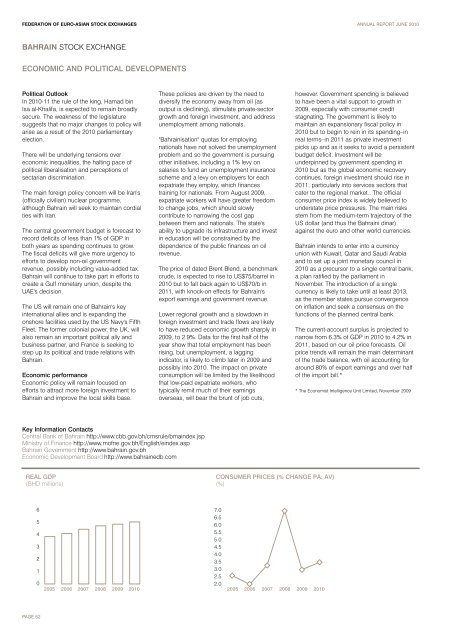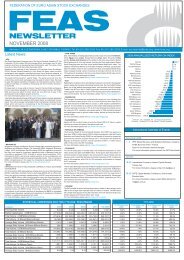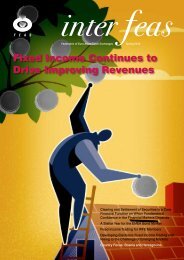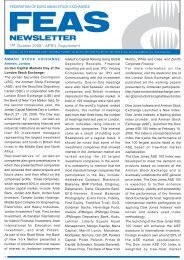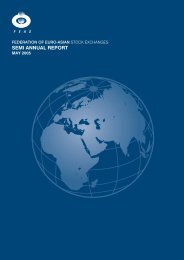Download - FEAS
Download - FEAS
Download - FEAS
- No tags were found...
You also want an ePaper? Increase the reach of your titles
YUMPU automatically turns print PDFs into web optimized ePapers that Google loves.
FEDERATION OF EURO-ASIAN STOCK EXCHANGES ANNUAL REPORT JUNE 2010BAHRAIN STOCK EXCHANGEECONOMIC AND POLITICAL DEVELOPMENTSPolitical OutlookIn 2010-11 the rule of the king, Hamad binIsa al-Khalifa, is expected to remain broadlysecure. The weakness of the legislaturesuggests that no major changes to policy willarise as a result of the 2010 parliamentaryelection.There will be underlying tensions overeconomic inequalities, the halting pace ofpolitical liberalisation and perceptions ofsectarian discrimination.The main foreign policy concern will be Iran's(officially civilian) nuclear programme,although Bahrain will seek to maintain cordialties with Iran.The central government budget is forecast torecord deficits of less than 1% of GDP inboth years as spending continues to grow.The fiscal deficits will give more urgency toefforts to develop non-oil governmentrevenue, possibly including value-added tax.Bahrain will continue to take part in efforts tocreate a Gulf monetary union, despite theUAE's decision.The US will remain one of Bahrain's keyinternational allies and is expanding theonshore facilities used by the US Navy's FifthFleet. The former colonial power, the UK, willalso remain an important political ally andbusiness partner, and France is seeking tostep up its political and trade relations withBahrain.Economic performanceEconomic policy will remain focused onefforts to attract more foreign investment toBahrain and improve the local skills base.These policies are driven by the need todiversify the economy away from oil (asoutput is declining), stimulate private-sectorgrowth and foreign investment, and addressunemployment among nationals."Bahrainisation" quotas for employingnationals have not solved the unemploymentproblem and so the government is pursuingother initiatives, including a 1% levy onsalaries to fund an unemployment insurancescheme and a levy on employers for eachexpatriate they employ, which financestraining for nationals. From August 2009,expatriate workers will have greater freedomto change jobs, which should slowlycontribute to narrowing the cost gapbetween them and nationals. The state'sability to upgrade its infrastructure and investin education will be constrained by thedependence of the public finances on oilrevenue.The price of dated Brent Blend, a benchmarkcrude, is expected to rise to US$75/barrel in2010 but to fall back again to US$70/b in2011, with knock-on effects for Bahrain'sexport earnings and government revenue.Lower regional growth and a slowdown inforeign investment and trade flows are likelyto have reduced economic growth sharply in2009, to 2.9%. Data for the first half of theyear show that total employment has beenrising, but unemployment, a laggingindicator, is likely to climb later in 2009 andpossibly into 2010. The impact on privateconsumption will be limited by the likelihoodthat low-paid expatriate workers, whotypically remit much of their earningsoverseas, will bear the brunt of job cuts,however. Government spending is believedto have been a vital support to growth in2009, especially with consumer creditstagnating. The government is likely tomaintain an expansionary fiscal policy in2010 but to begin to rein in its spending–inreal terms–in 2011 as private investmentpicks up and as it seeks to avoid a persistentbudget deficit. Investment will beunderpinned by government spending in2010 but as the global economic recoverycontinues, foreign investment should rise in2011, particularly into services sectors thatcater to the regional market.. The officialconsumer price index is widely believed tounderstate price pressures. The main risksstem from the medium-term trajectory of theUS dollar (and thus the Bahraini dinar)against the euro and other world currencies.Bahrain intends to enter into a currencyunion with Kuwait, Qatar and Saudi Arabiaand to set up a joint monetary council in2010 as a precursor to a single central bank,a plan ratified by the parliament inNovember. The introduction of a singlecurrency is likely to take until at least 2013,as the member states pursue convergenceon inflation and seek a consensus on thefunctions of the planned central bank.The current-account surplus is projected tonarrow from 6.3% of GDP in 2010 to 4.2% in2011, based on our oil price forecasts. Oilprice trends will remain the main determinantof the trade balance, with oil accounting foraround 80% of export earnings and over halfof the import bill.** The Economist Intelligence Unit Limited, November 2009Key Information ContactsCentral Bank of Bahrain http://www.cbb.gov.bh/cmsrule/bmaindex.jspMinistry of Finance http://www.mofne.gov.bh/English/eindex.aspBahrain Government http://www.bahrain.gov.bhEconomic Development Board http://www.bahrainedb.comREAL GDP(BHD millions)CONSUMER PRICES (% CHANGE PA; AV)(%)65432102.02.53.03.54.04.55.05.56.06.57.02005 2006 2007 2008 2009 2010 2005 2006 2007 2008 2009 2010PAGE 52


